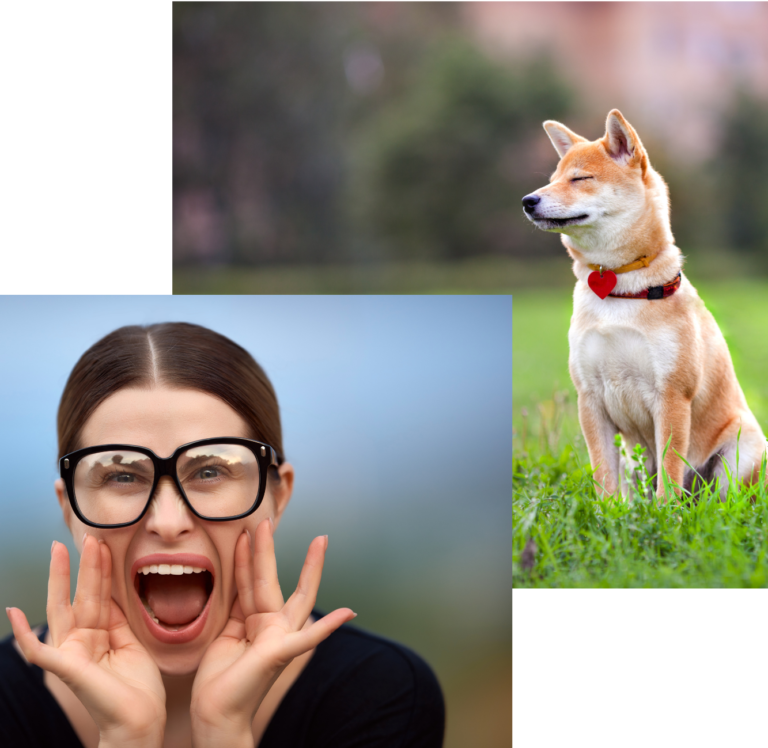Do our emotions affect our dogs?

Our dogs are masters of observation. They observe their surroundings and us. Because we live so closely together, our dogs have the opportunity to watch us very closely every day. They know our different moods and our body language. Through this observation, our dogs can tell what mood we are in.
If our dogs can read us so well, are they influenced by our emotions or even infected by it? We will address this question in this post. The information I will share with you is from research reports that I will link to and my own experiences as a dog trainer and dog owner.
What are emotions?

Emotions express feelings such as Love, happiness, sadness, or anger. Emotions are not just feelings, but also a physical reaction and thought process that arise from them.
Do dogs have emotions?

Although dogs were denied any emotions in the past, thanks to research and common sense, we have finally realized that dogs also feel emotions. Therefore, it is also essential for us to observe our dogs and understand what feelings they are currently experiencing. This allows us to help our dogs in difficult situations.
We now know what emotions are and that our dogs also feel them. Can our dogs perceive our feelings, react to them, or even take over them by observing them?
Perceiving feelings:
As a dog trainer, I have some customers who need help with recall. I often hear that even though you have followed every step for a successful recall, your dog won't return. After this statement, I usually ask two questions: How do you move your body, and what does your voice sound like when you call?
Some then say that they turn or move away from the dog, and because most of them are annoyed because the dog doesn't want to come, the voice usually gets louder and louder. In these cases, I always try to hold a mirror up to my clients politely.
Would you come to me if I turned away from you, showed disinterest, and shouted loudly and angrily? Most people understand why the dog doesn't come back and why there are problems with the callback.
Dogs perceive precisely what we feel and how we behave, and just like us, they don't like to be around people in a bad mood and shout.

Respond to emotions
We'll stick with the example of the recall problems.
You may have been in this situation or observed others doing it. What does the dog do when the owner calls and gets angrier and angrier? You can often see him slowing down, repeatedly looking away from the owner, sniffing the grass or other objects, licking his mouth, yawning, or even lying down. What does that mean? Does the dog want to annoy his owner, like I hear from time to time? Dogs never intend to annoy their humans, and every action has a reason. Here, the dog wants to appease his human. He picks up on the emotions and reacts to them with his body language also called calming signals.
He wants to defuse the situation and calm his owner.

Can our feelings be passed on to our dogs?
Here's a little story from myself:
When Akito was about six months old, we had an experience where I became so aware of all these emotional questions that I've been paying close attention to my feelings ever since. That day, I wasn't in a good mental state; I had just a bad day. Akito and I went outside for a walk, where I continued to sulk. As the walk progressed, Akito became slower and slower, sniffed objects for longer, occasionally stopping to look away from me and licking his snout more often. But in my state of mind, I obviously couldn't read his reactions; I became a little grumpier because we weren't making much progress, and I just wanted to go home. Ultimately, he just sat down and didn't want to go any further (and Shibas are really good at that). I was in a bad mood and annoyed and wanted to go home.
I started to scold, and when I tried to approach Akito, he began to scold me. And precisely at that moment, I realized that my emotions had infected him and that this behavior was my fault. He tried several times to calm me down politely, but I didn't notice this, so we got to the moment where we both scolded. Afterward, I just sat down and tried to calm myself down, and after a few minutes, when I slowly started to feel better again, Akito came up to me and sat down next to me. After another 10 minutes, we were both in a much better mood and could continue our walk.
Another example:
A customer told me that his dog behaves strangely when they are together in the forest; he looks pretty stressed, pulls on the leash a lot, hardly sniffs, and doesn't calm down. He explained a little more, and I asked him how he likes walking in the forest. He replied that he didn't like the woods, that being in them was very stressful, and that he couldn't enjoy them. Here, too, the dog reacted to the emotions and then took over.
Dogs perceive our feelings; they try to respond to them, and if we can't read this, our dogs will experience the same emotions as us. Emotions are normal; sometimes, feeling angry, impatient, or frustrated is natural. But remember that this can impact your dog and that he may react differently than usual. Dogs that are more anxious by nature or experience (adopted dogs) or have a higher stress level are particularly affected by such emotions. We must become aware of this to avoid putting our dogs in unnecessary situations they cannot handle.
